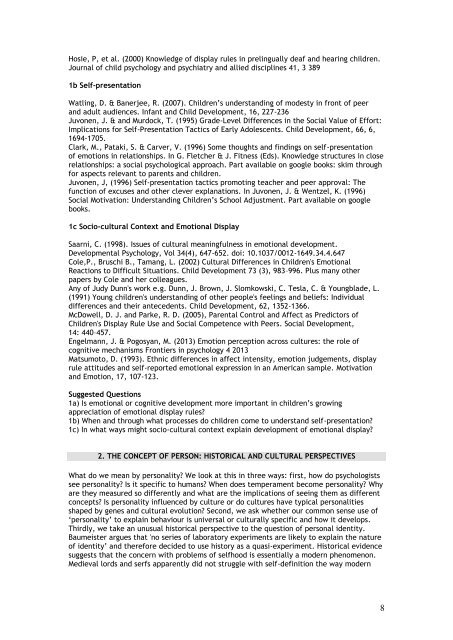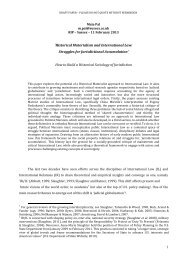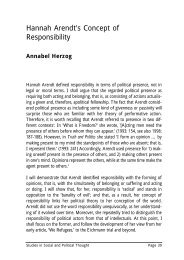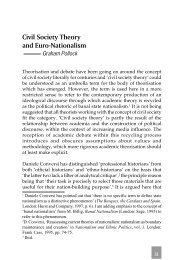Social Cognitive Development handbook 13-14 - University of Sussex
Social Cognitive Development handbook 13-14 - University of Sussex
Social Cognitive Development handbook 13-14 - University of Sussex
You also want an ePaper? Increase the reach of your titles
YUMPU automatically turns print PDFs into web optimized ePapers that Google loves.
Hosie, P, et al. (2000) Knowledge <strong>of</strong> display rules in prelingually deaf and hearing children.<br />
Journal <strong>of</strong> child psychology and psychiatry and allied disciplines 41, 3 389<br />
1b Self-presentation<br />
Watling, D. & Banerjee, R. (2007). Children’s understanding <strong>of</strong> modesty in front <strong>of</strong> peer<br />
and adult audiences. Infant and Child <strong>Development</strong>, 16, 227-236<br />
Juvonen, J. & and Murdock, T. (1995) Grade-Level Differences in the <strong>Social</strong> Value <strong>of</strong> Effort:<br />
Implications for Self-Presentation Tactics <strong>of</strong> Early Adolescents. Child <strong>Development</strong>, 66, 6,<br />
1694-1705.<br />
Clark, M., Pataki, S. & Carver, V. (1996) Some thoughts and findings on self-presentation<br />
<strong>of</strong> emotions in relationships. In G. Fletcher & J. Fitness (Eds). Knowledge structures in close<br />
relationships: a social psychological approach. Part available on google books: skim through<br />
for aspects relevant to parents and children.<br />
Juvonen, J, (1996) Self-presentation tactics promoting teacher and peer approval: The<br />
function <strong>of</strong> excuses and other clever explanations. In Juvonen, J. & Wentzel, K. (1996)<br />
<strong>Social</strong> Motivation: Understanding Children’s School Adjustment. Part available on google<br />
books.<br />
1c Socio-cultural Context and Emotional Display<br />
Saarni, C. (1998). Issues <strong>of</strong> cultural meaningfulness in emotional development.<br />
<strong>Development</strong>al Psychology, Vol 34(4), 647-652. doi: 10.1037/0012-1649.34.4.647<br />
Cole,P., Bruschi B., Tamang, L. (2002) Cultural Differences in Children's Emotional<br />
Reactions to Difficult Situations. Child <strong>Development</strong> 73 (3), 983–996. Plus many other<br />
papers by Cole and her colleagues.<br />
Any <strong>of</strong> Judy Dunn's work e.g. Dunn, J. Brown, J. Slomkowski, C. Tesla, C. & Youngblade, L.<br />
(1991) Young children's understanding <strong>of</strong> other people's feelings and beliefs: Individual<br />
differences and their antecedents. Child <strong>Development</strong>, 62, <strong>13</strong>52-<strong>13</strong>66.<br />
McDowell, D. J. and Parke, R. D. (2005), Parental Control and Affect as Predictors <strong>of</strong><br />
Children's Display Rule Use and <strong>Social</strong> Competence with Peers. <strong>Social</strong> <strong>Development</strong>,<br />
<strong>14</strong>: 440–457.<br />
Engelmann, J. & Pogosyan, M. (20<strong>13</strong>) Emotion perception across cultures: the role <strong>of</strong><br />
cognitive mechanisms Frontiers in psychology 4 20<strong>13</strong><br />
Matsumoto, D. (1993). Ethnic differences in affect intensity, emotion judgements, display<br />
rule attitudes and self-reported emotional expression in an American sample. Motivation<br />
and Emotion, 17, 107-123.<br />
Suggested Questions<br />
1a) Is emotional or cognitive development more important in children’s growing<br />
appreciation <strong>of</strong> emotional display rules?<br />
1b) When and through what processes do children come to understand self-presentation?<br />
1c) In what ways might socio-cultural context explain development <strong>of</strong> emotional display?<br />
2. THE CONCEPT OF PERSON: HISTORICAL AND CULTURAL PERSPECTIVES<br />
What do we mean by personality? We look at this in three ways: first, how do psychologists<br />
see personality? Is it specific to humans? When does temperament become personality? Why<br />
are they measured so differently and what are the implications <strong>of</strong> seeing them as different<br />
concepts? Is personality influenced by culture or do cultures have typical personalities<br />
shaped by genes and cultural evolution? Second, we ask whether our common sense use <strong>of</strong><br />
‘personality’ to explain behaviour is universal or culturally specific and how it develops.<br />
Thirdly, we take an unusual historical perspective to the question <strong>of</strong> personal identity.<br />
Baumeister argues that 'no series <strong>of</strong> laboratory experiments are likely to explain the nature<br />
<strong>of</strong> identity’ and therefore decided to use history as a quasi-experiment. Historical evidence<br />
suggests that the concern with problems <strong>of</strong> selfhood is essentially a modern phenomenon.<br />
Medieval lords and serfs apparently did not struggle with self-definition the way modern<br />
8
















